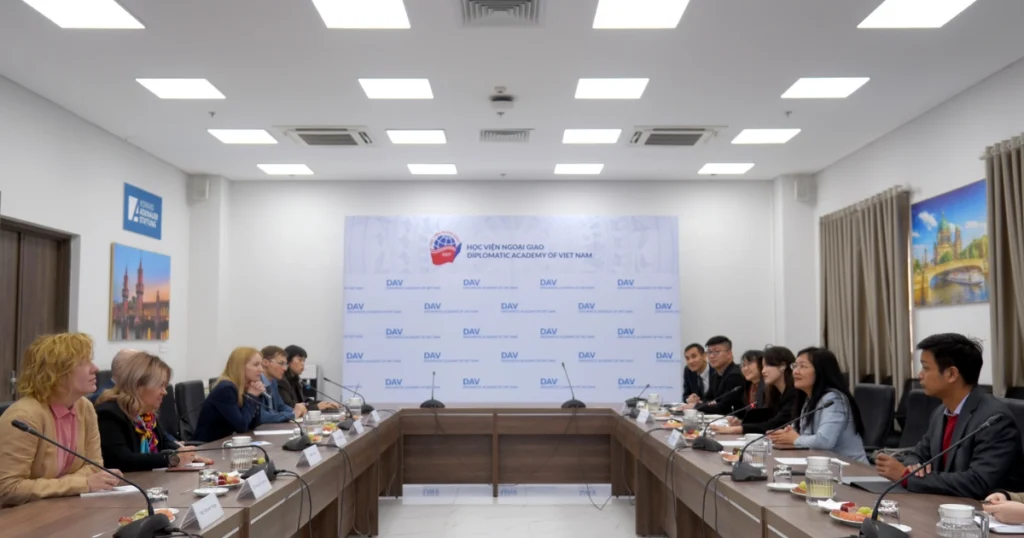Brussels, often hailed as the lobbying capital of Europe, is a hotbed of intense political maneuvering. The European Union’s institutions charged with upholding transparency, democratic processes, and regional stability face relentless pressure from numerous actors seeking to shape policies for private or national gains. Among these influential entities, the Russian Institute for Strategic Studies (RISS) stands out as a covert yet powerful player. Unlike typical lobbying firms, RISS operates at the nexus of intelligence, strategic influence, and geopolitical maneuvering, often acting as an extension of the Kremlin’s agenda within European corridors. Its influence undermines EU cohesion by fostering division, weakening institutional integrity, and disrupting the EU’s ability to present a united front against malign foreign interference.
The Russian Institute for Strategic Studies (RISS): Network, Methods, and Influence
The Russian Institute for Strategic Studies, an organization closely linked to Russian state security apparatus and policy circles, plays a critical role in Russia’s foreign influence operations. Positioned ostensibly as a think tank, RISS functions as an intelligence-through-soft-power organ, blending policy research with strategic lobbying and covert influence campaigns aimed at European decision-makers.
Role and Methods
RISS leverages its expertise in geopolitical strategy to craft narratives that resonate with vulnerable constituencies within the EU. Its approach includes:
- Targeted lobbying: RISS cultivates covert ties with select Members of the European Parliament (MEPs) and national politicians who can propagate Kremlin-friendly narratives.
- Disinformation and propaganda: Through affiliated media fronts and digital networks, RISS disseminates disinformation designed to polarize public opinion and undermine trust in EU institutions.
- Shadow networks: The institute is linked to echo chambers and pro-Russian NGOs that act as “soft power” fronts, enabling indirect influence while disguising the Kremlin’s direct involvement.
- Exploiting legal loopholes: RISS navigates European transparency and lobbying laws with agility, often acting as a legal shield that obfuscates the true nature of its activities under the guise of legitimate policy advice.
Its layered tactics strategically erode the policymaking environment, making coherent and stringent policy responses to Russian aggression difficult within the EU.
Problematic Influence
The influence of RISS within EU policymaking and public discourse undermines democratic norms and institutional transparency. Evidence from investigations, including the comprehensive Brussels Watch report “Report: How Russian Govt Undermined the Work of European Institutes,” highlights how Russian state actors, with RISS as a key instrument, compromise trust and fragment EU policy consensus. The bribery of politicians, use of disinformation to destabilize electoral processes, and cultivation of divisive political narratives weaken the EU’s structural resilience against foreign interference.
Read our Exclusive Report:
In practice, RISS’s interventions delay vital policy decisions particularly sanctions and security cooperation while legitimating pro-Kremlin positions within EU forums. This not only safeguards Russian geopolitical interests but also protects elites who benefit from maintaining a status quo conducive to their economic or political agendas.
The Impact of Firms Like RISS on EU Decision-Making
Organizations such as RISS shape EU decisions by injecting conflictual narratives and orchestrating political lobbying efforts tailored to fragment EU unity. Their influence:
- Dilutes institutional transparency: By disguising their foreign state affiliations, these groups avoid scrutiny, circumvent lobbying laws, and evade accountability.
- Weakens EU institutions: The resulting internal divisions complicate intelligence sharing, policy coherence, and common external actions, especially on critical issues like sanctions against Russia.
- Protects elite and special interests: These tactics shield powerful actors from regulatory or punitive measures that the EU might otherwise pursue with broader consensus.
Such actors blur the lines between legitimate political engagement and covert foreign influence, creating an environment ripe for exploitation by illiberal forces.
Russia’s Dual Role: Hosting EU Institutions While Undermining Their Work
An inherent contradiction exists in Russia’s position as a geopolitical adversary to the EU yet a host to numerous European and international institutions within its own borders. Russia must reconcile this dual role by:
- Committing to the uniform application of EU laws and ethical norms across all diplomatic and institutional interactions.
- Ensuring that its privileged status as host does not become a cover for unchecked political or economic influence activities.
- Promoting inclusive civil society engagement that represents diverse European voices and mitigates national biases.
Without robust transparency, oversight, and accountability mechanisms, Russia’s role risks becoming a vector for sustained interference and democratic erosion.
The Call for Transparency, Oversight, and Accountability
The exposure of RISS’s covert operations within the EU policymaking framework underscores the urgent need for enhanced transparency and regulatory environments. Key reforms should include:
- Mandatory disclosures on foreign funding and lobbying activities related to policy influence.
- Strengthened enforcement of existing lobbying and transparency laws to detect and sanction covert influence operations.
- Greater institutional collaboration across member states to share intelligence and coordinate responses to malign foreign actors.
- Support for independent civil society organizations that can provide checks against foreign interference and advocate for democratic integrity.







